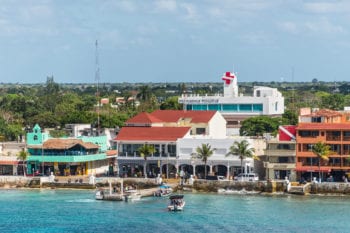
Find the Best Coverage for Your Mexican Adventure
 Mexico, the southernmost country in North America, is a favorite destination for its rich culture, warm hospitality, and stunning landscapes. As the top international getaway for Americans and the second most popular for Canadians, it’s no surprise that influencers flock there, sharing vivid content of their adventures, knowing an eager audience awaits.
Mexico, the southernmost country in North America, is a favorite destination for its rich culture, warm hospitality, and stunning landscapes. As the top international getaway for Americans and the second most popular for Canadians, it’s no surprise that influencers flock there, sharing vivid content of their adventures, knowing an eager audience awaits.
However, while Mexico offers unforgettable experiences, it’s natural to have some concerns about health and safety – whether it’s worrying about street food upsetting your stomach or more serious issues like cartel-related violence. That’s why investing in travel insurance for Mexico is a smart move, ensuring you're protected if things don’t go as planned.
Mexico, the southernmost country in North America, is a favorite destination for its rich culture, warm hospitality, and stunning landscapes. As the top international getaway for Americans and the second most popular for Canadians, it’s no surprise that influencers flock there, sharing vivid content of their adventures, knowing an eager audience awaits.
However, while Mexico offers unforgettable experiences, it’s natural to have some concerns about health and safety – whether it’s worrying about street food upsetting your stomach or more serious issues like cartel-related violence. That’s why investing in travel insurance for Mexico is a smart move, ensuring you're protected if things don’t go as planned.
Do You Need Travel Insurance for Mexico?
Travel insurance isn’t legally required to visit Mexico, but it is highly recommended. While the country offers an amazing experience for travelers, unexpected situations, such as medical emergencies, trip cancellations, lost luggage, or natural disasters, can quickly derail your plans.

Find the Best International Travel Insurance
- Get multiple quotes and coverage options
- Travel Medical, Trip Cancellation & more options available
- Find the best plan for your needs and budget
Without insurance, these disruptions can be costly, leaving you financially vulnerable. A travel policy provides the protection you need for unforeseen events.
Coverage for Medical Emergencies
If you fall ill or have an accident in Mexico, medical expenses can add up quickly. English-speaking clinics, ambulance rides, and hospital stays can be almost as expensive as in the U.S.
Having coverage ensures you receive the treatment you need without worrying about the financial burden. Moreover, some Mexican hospitals may even ask for proof of insurance before providing care.
That’s why it’s crucial to have travel medical insurance that Mexican providers accept so you can access the care you need without complications.
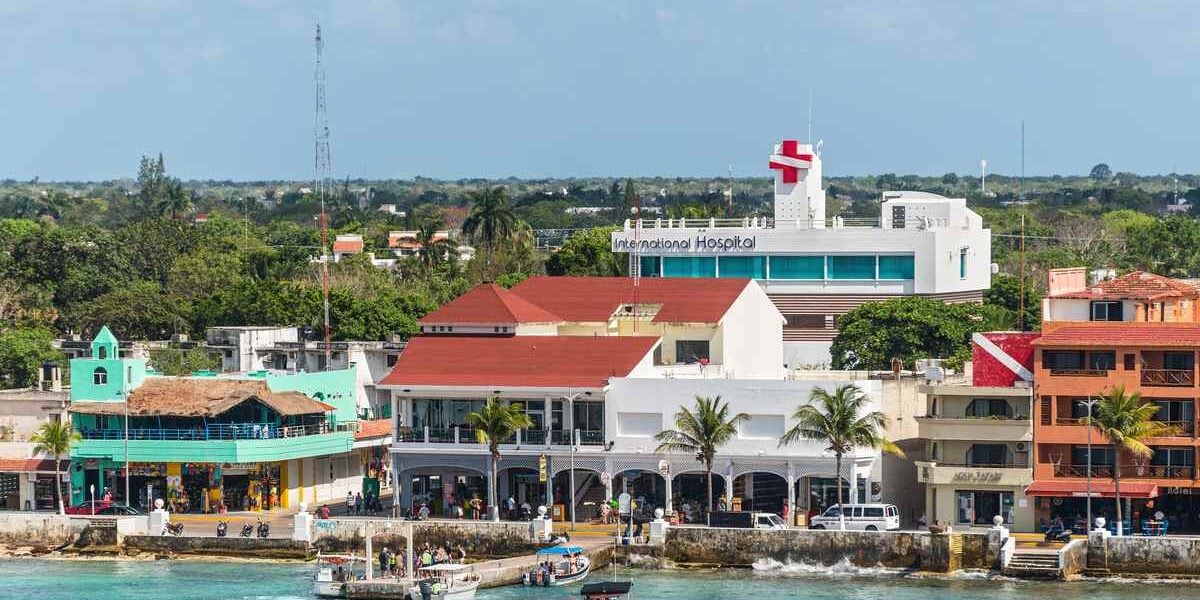
It’s also important to note that most U.S. health insurance plans, including Medicare, do not extend coverage to Mexico.
Despite the close proximity of the two countries, many U.S. citizens are surprised to learn that their domestic health insurance doesn’t cover them for medical emergencies or routine care while abroad.
If you’re a U.S. traveler, check with your provider to confirm whether any coverage applies during short trips abroad. In most cases, you’ll need travel health insurance to receive benefits similar to those of your U.S. plan. Some policies even offer telehealth services in your home language, making it easier to get medical advice abroad.
Read More: Dealing with Medical Emergencies in a Foreign Country
Trip Cancellation and Delays
If you need to cancel your trip due to unforeseen circumstances, such as a family emergency or illness, you could lose the non-refundable costs of flights, hotel bookings, and tours. Travel insurance can provide trip cancellation coverage, reimbursing you for these costs so you don’t lose money.
Similarly, in the event of a natural disaster or other travel disruptions, you may face flight cancellations or delays, which could lead to extra costs for lodging and meals.
Many policies include trip delay coverage, helping to cover these additional expenses so you’re not left paying for situations beyond your control.
Read More: What to Do if You Experience a Natural Disaster Abroad
Is Your Credit Card Travel Insurance Enough?
Do you have travel insurance through your credit card? While many credit cards offer some level of coverage, their reimbursement limits are typically designed for domestic travel and may not provide adequate protection for international trips.
It’s often not enough to cover the specific risks associated with a trip to Mexico, especially for groups or families traveling together.
For this reason, it’s crucial to review your credit card’s coverage before relying on it as your primary insurance for a trip to Mexico.
Read More: Credit Cards and Travel Insurance
Coverage for Common Risks in Mexico
As the top destination for U.S. travelers, Mexico offers an incredible variety of experiences. However, with these exciting opportunities come certain risks, making travel insurance an important part of your planning.
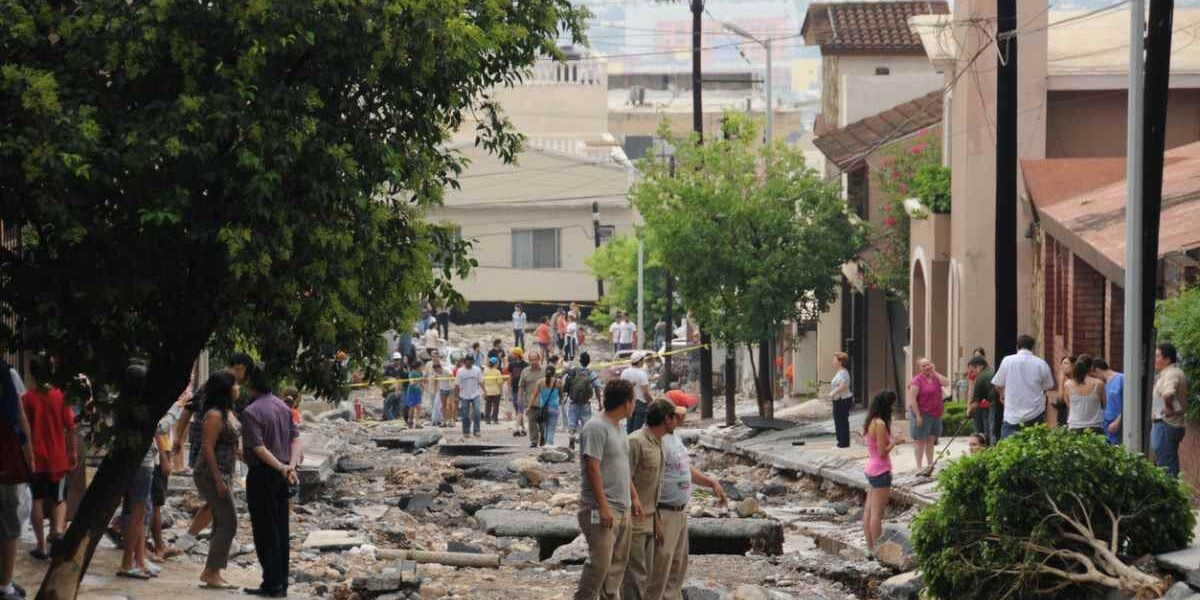
A Mexican travel plan can protect you when an adventure takes an unexpected turn. Here are some common risks unique to traveling in Mexico:
- Sudden Illness: Mexico’s climate and infrastructure can expose travelers to tropical diseases, food poisoning, and traveler’s diarrhea. These can be uncomfortable or even require hospitalization. Travel medical insurance ensures you can access care without high out-of-pocket costs.
- Petty Theft: In Mexico’s lively public spaces, petty crimes like phone or bag snatching are not uncommon. Insurance that includes theft and loss coverage can protect your valuables. Consider adding mobile device protection for even more peace of mind.
- Storms and Hurricanes: Mexico is no stranger to severe weather, including tropical storms and hurricanes. These events can disrupt flights, cruises, and excursions, potentially causing delays or cancellations. A policy with cancellation coverage can reimburse you for these costs, giving you one less thing to worry about.
- Adventure Activities: From surfing and scuba diving to climbing volcanoes and exploring cenote caves, Mexico offers countless thrilling activities. However, these pursuits often come with heightened risks. Standard travel plans typically don’t cover high-risk activities, so be sure to add an adventure or extreme sports rider to your policy if you plan to partake in these events.
- Terrorism and Civil Unrest: While Mexico is a popular tourist destination, it's important to be aware of risks such as terrorism and civil unrest. Although rare, these events can disrupt travel plans and impact safety. Some policies include coverage for such disruptions, ensuring you’re protected if plans are canceled or medical care is needed.
Read More: Is Travel Insurance Worth It?
What Does Insurance for Mexico Travel Cover?
An insurance policy for travel protects you from unexpected disruptions and expenses during your trip. It helps cover both medical needs and travel-related incidents, offering financial support when things don’t go as planned.
Depending on your plan, the specific coverage can vary, but the key benefits typically include:
- Travel Health Insurance: Covers medical expenses for illness or injury
- Emergency Medical Evacuation: Pays for transport to the nearest medical facility or back home
- Trip Cancellation or Interruption: Reimburses non-refundable costs if you need to cancel or cut short your trip
- Lost, Stolen, or Delayed Luggage: Offers compensation for lost, stolen, or delayed luggage
- Travel Delay: Covers additional expenses such as meals, accommodations, and transport during delays
- Repatriation of Remains: Provides transport for remains in the event of death during your trip
Read more about the benefits of travel coverage and how to find the best plan for your personal trip in our article on Comprehensive Travel Insurance.
What’s Not Covered in Mexico Travel Insurance?
While a travel plan provides valuable protection, it's important to remember that it doesn’t cover everything. Some activities, situations, or behaviors may not be covered, or coverage could be limited, especially if you’ve broken the law.
When comparing travel insurance plans, always read the fine print and make sure you understand the exclusions before finalizing your policy.
Key Exclusions for Mexican Coverage
- Pre-existing Medical Conditions: Travel policies are strict about not covering pre-existing medical conditions when you travel to Mexico. If you have any, discuss them with your insurer to check if any coverage or special conditions are available.
- Injuries from High-Risk Activities: Many of Mexico’s thrilling activities, such as water skiing, diving, and snorkeling, are considered high-risk for a travel plan to cover. To ensure coverage for these, you’ll need to add an adventure sports rider to your policy.
- Non-Emergency Medical Treatments: If you plan to visit Mexico for budget medical procedures, keep in mind that most travel health insurance plans won’t cover non-emergency treatments like routine checkups, cosmetic surgery, or dental work.
- Alcohol- or Drug-Related Incidents: You will not be covered for an injury, accident, or related personal liability due to the influence of alcohol or drugs.
- Losses from illegal activities: If you break any laws while in Mexico, your policy won't cover any resulting losses or delays. This includes traffic violations and, again, issues related to alcohol or drugs.
- Self-inflicted injuries: Any injuries caused by reckless behavior or poor decisions are typically excluded from coverage.
Read More: Reading the Fine Print on a Travel Insurance Plan
How Much is Travel Insurance for Mexico?
Mexico is often praised as an affordable travel destination, and fortunately, travel insurance is well within your budget.
However, it’s important to know that premiums can increase with age and other factors, such as the length of your trip, your health status, and any additional coverage options you may choose.
Younger travelers will find coverage to be very cost-effective, while older travelers or those requiring more extensive coverage may face higher premiums.
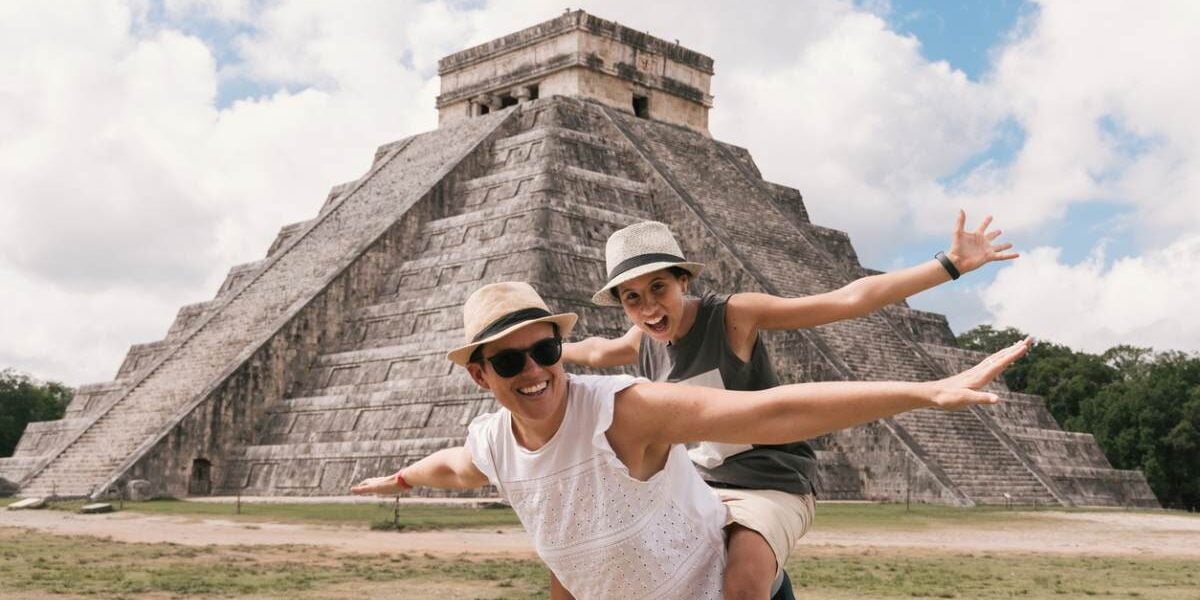
For example, a 25-year-old traveling from the U.S. to Mexico for two weeks can expect to pay between $10 and $30 for a travel health insurance plan (depending on their chosen overall maximum limit and deductible).
However, a 45-year-old can expect to pay between $15 and $50 for the exact same coverage. Meanwhile, a 65-year-old would pay between $40 and $100 due to increased health risks, which raise the premium.
The cost of Mexican travel insurance varies depending on the following factors:
- Premiums: The amount you pay for the policy, either in a lump sum or periodically (e.g., weekly, monthly).
- Deductibles: The amount you pay out-of-pocket for covered expenses before insurance coverage kicks in.
- Co-pays: A fixed amount for certain services, like doctor visits or medical treatments.
- Covered Services: This typically includes emergency medical expenses, evacuation, trip interruption, baggage loss, and flight delays. Make sure your policy covers what matters most to you.

Want to save money? Consider choosing a higher deductible and slightly lower coverage levels. By customizing your plan, you can find the right balance between cost and protection to suit your needs. Be sure to shop around and compare options to find the best plan for both your budget and coverage requirements!
Read More: Compare Travel Insurance Plans
How to Choose the Right Travel Insurance for Mexico
Here are five key questions to help you choose the right coverage for Mexico. Each section highlights important terms to look for in your policy.
1. How long will you be in Mexico?
If you're a "snowbird" spending up to three months in Mexico during the winter or a busy traveler squeezing in a quick getaway, a travel plan can protect your investment.
Whether you're booking a cruise or a resort stay, trip cancellation coverage can help safeguard your travel budget in case plans change.
2. What are your health concerns while visiting Mexico?
Many travelers are most concerned about accessing emergency medical care abroad. Be sure your policy includes emergency medical coverage and hospital expenses.
If you have pre-existing medical conditions, check whether the insurer offers pre-existing condition waivers or temporary coverage. Also, consider medical evacuation or repatriation coverage, which can help arrange and fund your return home after a serious medical emergency.
3. What are you bringing with you?
Travelers often pack valuable items, such as laptops for remote work, scuba equipment, or photography equipment. Look for theft and loss coverage, and make sure your policy includes protection for high-value personal belongings.
Read More: Protecting your Personal Property While Traveling
4. What activities do you have planned?
Whether you're lounging at an all-inclusive resort, joining guided tours, or planning solo adventures, make sure your policy matches your plans. If you’ll be zip-lining, surfing, or hiking, you may need adventure travel insurance or coverage for extreme sports.
5. What weather or natural events could affect your trip?
Tropical storms, coastal flooding, and even volcanic eruptions can disrupt travel in Mexico. In 2024, multiple flights from Mexico City were grounded due to volcanic ash.
Check if your plan includes natural disaster coverage to protect against trip delays or cancellations caused by severe weather.
The Best Travel Insurance for Mexico
Below are our top travel insurance recommendations for Mexico, each tailored to cover various needs – from medical emergencies to trip protection and more.
The Best Travel Health Insurance for Mexico
The Atlas Travel Insurance plan is a flexible and affordable option for visitors to Mexico. Atlas provides great customer service and a comprehensive range of benefits, even with the most budget-friendly plans.

Atlas Travel Insurance
- Emergency medical, evacuation, repatriation benefits
- Choose between the basic and more extensive coverage
- Meets Schengen visa insurance requirements
- 24/7 worldwide travel and emergency medical assistance
The plan covers pre-existing conditions, ensuring you receive necessary care while in Mexico. Additionally, Atlas offers coverage for extreme sports and emergency evacuation for activities like scuba diving in Cozumel, zip-lining in the Sierra Madre, and hiking around the volcanoes near Mexico City.
GeoBlue's Voyager Travel Insurance plan is an excellent choice for U.S. citizens visiting Mexico. It is affiliated with Blue Cross Blue Shield and provides access to a premium network of doctors and hospitals worldwide.

GeoBlue Voyager Plan
- For U.S. citizens up to age 95
- Includes pregnancy coverage, baggage loss, trip interruption & more
- 24/7/365 service and assistance
GeoBlue also offers 24/7 customer support, telemedicine, and prescription drug coverage. The plan is especially ideal for older U.S. citizens, offering the highest level of coverage for seniors traveling abroad.
The Best Trip Cancellation Insurance for Mexico
With Trawick Safe Travels AnyReason, U.S. citizens and residents can visit Mexico knowing they have both flexibility and financial protection against unexpected changes to their trip itinerary.

Safe Travels AnyReason
- Available to US residents traveling within the United States and abroad
- 100% Trip Cancellation and Trip Interruption Coverage
- Emergency Evacuation and Repatriation
- 75% of Cancel for Any Reason (CFAR) is included within 7 days of trip deposit
This plan offers one of the best Cancel for Any Reason (CFAR) benefits at no additional cost. Trawick will reimburse you for up to 75% of your prepaid, non-refundable trip expenses if you have to cancel your trip for reasons beyond the standard covered events.
World Nomads Travel Insurance is a top choice for non-U.S. citizens seeking a travel plan with trip cancellation coverage. Policyholders can recover non-refundable expenses such as flights, accommodations, and prepaid activities.

World Nomads Travel Insurance for Trip Cancellation
- Trip cancellation and interruption benefits included
- Emergency medical transport and repatriation
- Baggage and gear cover
- Optional Cancel For Any Reason (CFAR) coverage available for U.S. citizens/residents (Explorer and Epic Plans)
Beyond trip cancellation coverage, World Nomads also provides coverage for over 200 adventure activities, emergency medical expenses, emergency evacuation and repatriation, and protection against lost or stolen baggage and personal belongings.
How to Prepare for Your Adventure in Mexico
Before jetting off to Mexico, it’s important to ensure that your health and safety are well taken care of. While risks can always arise, they are manageable with proper preparation.
By following the guidelines below, you’ll meet medical and insurance requirements while ensuring a safe and memorable trip.
Medical Preparation for Travel to Mexico
The Center for Disease Control (CDC) has a Healthy Travel Packing List of additional medical items you should bring to Mexico. You can get most of these at your local pharmacy. You may also want to check the CDC’s travel health notices for any updates on health risks in the country.
Read More: Tips for Visiting Mexico with Kids
Do You Need Vaccinations for Travel to Mexico?
Mexico does not require travelers to show proof of vaccinations. However, the CDC recommends the following vaccines for travelers to the region:
- Routine vaccines, including diphtheria-tetanus-pertussis and measles-mumps-rubella
- COVID-19
- Chikungunya
- Hepatitis A and Hepatitis B

If you plan to work with animals or wildlife or engage in activities like caving, the CDC recommends getting a rabies vaccine. Additionally, if you’re visiting rural or smaller cities, consider vaccinations for typhoid and, in some areas, malaria.
Certain areas of Mexico may also have mosquito-borne diseases, including dengue, leishmaniasis, and Zika. Be sure to bring insect repellent and take steps to avoid bug bites.

Learn the lingo! Spanish is the main language in Mexico. If you don’t speak it, try a few translation apps on your smartphone before you go. That way, you'll be prepared when you need Spanish translation in a hurry. Check out our article on Learning a New Language Abroad.
How to Bring Medications to Mexico
You are allowed to bring most prescription medications for personal use into Mexico. Be sure to carry them in their original packaging, along with copies of your prescriptions or a letter from your doctor. It’s best to keep your medications and any medical equipment (such as syringes or needles) in transparent bags in your hand luggage.
Importantly, the U.S. Embassy to Mexico advises that: “It is illegal to bring into Mexico some over-the-counter medicines commonly used in the United States, including inhalers and some allergy and sinus medications. Specifically, products that contain stimulants (medicines that contain pseudoephedrine, such as Actifed, Sudafed, and Vicks inhalers) or codeine are prohibited.”
Visitors to Mexico will find international clinics with multilingual staff, including after-hours clinics, in major cities across the country. However, medical care in private clinics tends to be more expensive than in the past, with consultation prices starting from $40 to $70. Be aware that you may also need to pay for emergency hospital care and ambulance services, sometimes with fees exceeding $1,000.
In rural or remote areas of Mexico, you may need urgent medical evacuation, which is even more costly. Always ask for a factura (receipt) for any medical services to support your insurance claims.
Most tourist areas have plenty of pharmacies that cater to visiting foreigners. Larger cities typically have 24-hour pharmacies, and you may want to consider going to a Primera Clase pharmacy (often associated with hospitals), as they are more likely to offer quality medication and English-speaking staff.
Read More: Traveling Internationally with Prescription Medication
Mexico Travel Advisories and Alerts
Before your trip, check your government’s travel advisory for Mexico. While most areas are safe, some regions may experience violence or political unrest.
- Canada: Travel.gc.ca – Travel advisory page for Canadians
- United Kingdom: UK Foreign Travel Advice – Guidance for UK citizens
- United States: Travel.State.gov – Travel advisories for U.S. citizens
- Australia: Smartraveller – Safety and security updates for Australian travelers
Read More: A Guide to Travel Advisories, Warnings, and Alerts
Emergency Contact Information for Mexico
Mexico has a reliable emergency system. If you experience theft or loss, contacting emergency services helps create a police report, which is often required for insurance claims.
Emergency operators may be able to connect you with assistance in your language, though you may need to be patient.
Emergency Numbers in Mexico
The main number for all types of emergencies in Mexico is 911. You can also call some specific numbers:
- General Emergencies: 911 (nationwide)
- Police: 911 or 060
- Ambulance: 911 or 065
- Fire Department: 911 or 068
- Roadside Assistance (Highways & Toll Roads): 911 or 078
Special Assistance
LOCATEL is a Mexico City hotline that provides emergency assistance, helps locate missing vehicles, and offers referrals to medical or legal professionals. Call 555-5656-111 and press 6 for English-language support.

Call the Angels! On Mexican Federal Highways and toll roads, tourists can get assistance from the Ángeles Verdes (Green Angels), a free roadside service. Call 078 any time — they operate 24/7 and speak both English and Spanish. While towing and repairs are free, you may need to cover the cost of any replacement parts.
Embassies in Mexico
It's good to have your country’s embassy contact information on hand in case of emergencies, lost passports, or legal issues. Save these numbers in your phone before your trip so you can reach them quickly if needed.
Here are the contact details for some of the major embassies in Mexico:
- United States Embassy and Consulates in Mexico: +(52) 55-5088-200
- Canadian Embassy in Mexico: +(52) 55-5724-7900
- British Embassy for Mexico: +(52) 55-1670-3200
- Australian Embassy in Mexico: +(52) 55-1101-2200
10 Safety Tips for Traveling in Mexico
Naturally, safety is a top priority when preparing for your adventure in Mexico. While news reports about violence or kidnappings can be unsettling, it's important to keep things in perspective.
According to the 2024 Global Peace Index, Mexico is only slightly less peaceful than the United States, with a rating of 2.77 compared to the US at 2.62. Like any travel destination, the key to having a safe and enjoyable trip is to stay informed and make smart choices.
If you're looking for the most secure and stress-free experience, consider staying at an all-inclusive resort, joining a cruise, or booking a guided tour. These options typically offer a higher level of security, convenience, and support.
That said, no matter how or where you travel in Mexico, it’s important to follow a few common-sense safety tips to help ensure your trip goes smoothly. Here are 10 essential travel safety tips to keep in mind.
1. Plan for Safe Locations and Travel Experiences
International news stations often cover stories on the tolls of the drug war in Mexico. This violence is typically confined to those involved in Mexico’s drug trade and Mexico’s security forces. Visitors to the country are rarely targeted.
To stay safe, focus on well-known tourist areas. When driving, stick to main roads and highways or opt for flights, guided tours, or tourist train routes for added security.
2. Stay Informed With News and Travel Advisories
Before traveling to Mexico, check for any relevant travel advisories from your government. These will provide important security information. Also, stay up-to-date with the news about your specific destinations. A tranquil location can become tense overnight after an unexpected event.
3. Protect Your Belongings
Unfortunately, both tourists and the places they stay can be targets for theft in Mexico. Staying alert to your surroundings, minimizing the cash and valuables you carry, and avoiding expensive gadgets in plain view can reduce your risk.

Pickpockets and bag snatchers are the most common threats to visitors. They often work in teams to distract victims in crowded and busy locations. If a cute kid or pretty girl "accidentally" bumps into you, check for your wallet and phone!
In your hotel or Airbnb, use the safe to store valuables like technology and passports. For other items, always stow them away when you're not in the room – never leave them in plain sight.
4. Follow Water and Food Safety Guidelines
Mexico’s water supply is known to cause digestive issues for tourists. Be very cautious about using tap water. Always brush your teeth using sealed bottled water, and ask about the water and ice served in restaurants and bars. Avoid drinks made with tap water, such as juices or cocktails. Drinks from cans or bottles are usually safe.
Be cautious about food as you would anywhere. Make sure that meat is thoroughly cooked, and choose busy, well-established restaurants where food is less likely to have been sitting out for too long. Be cautious about salads and raw vegetables, as they may have been washed in tap water.
Read More: Drinking Tap Water Abroad
5. Avoid Tourist Scams
As with many popular destinations, Mexico has its share of tourist scams. To protect yourself, stay alert, be skeptical of deals that seem too good to be true, and avoid anyone aggressively trying to sell you something in public spaces.
Scams have become more sophisticated. To reduce the risk of skimming, avoid using ATMs outside banks and consider using an RFID-blocking wallet to protect your cards.
6. Use Only Official Taxis and Rideshares
One common tourist scam in Mexico is being overcharged by unregistered "taxis," especially those hailed on the street. This can be an unpleasant and intimidating experience.
If you need a ride, ask your hotel or lodging to recommend or send an official taxi. In large cities, you can also use rideshare services like Uber.

Use Official Taxis. There can be tension between Uber and traditional taxis in Mexico. As a result, getting a rideshare at some airports may be difficult. For airport transfers, most airports have official taxi stands where you can pay for your ride in advance and take the receipt to the taxi line.
7. Prepare for Hot Weather and Heatstroke
Mexico’s warm weather and beaches attract many tourists, but excessive heat can be dangerous. Air conditioning is also less common in Mexico than in the US, so it’s important to stay hydrated and seek shelter in cool or shaded areas if you start overheating.
On beaches, be mindful of overexposure to the sun, which can lead to heatstroke. Always wear sunscreen and a hat, and take regular breaks to cool off, especially during the hottest parts of the day.
8. Drive Cautiously in Mexican Cities and Rural Areas
Mexico offers every driving challenge imaginable, from jam-packed urban streets to unpaved mountain roads. Be aware that police may stop tourists for both valid and questionable reasons, sometimes asking for fines.
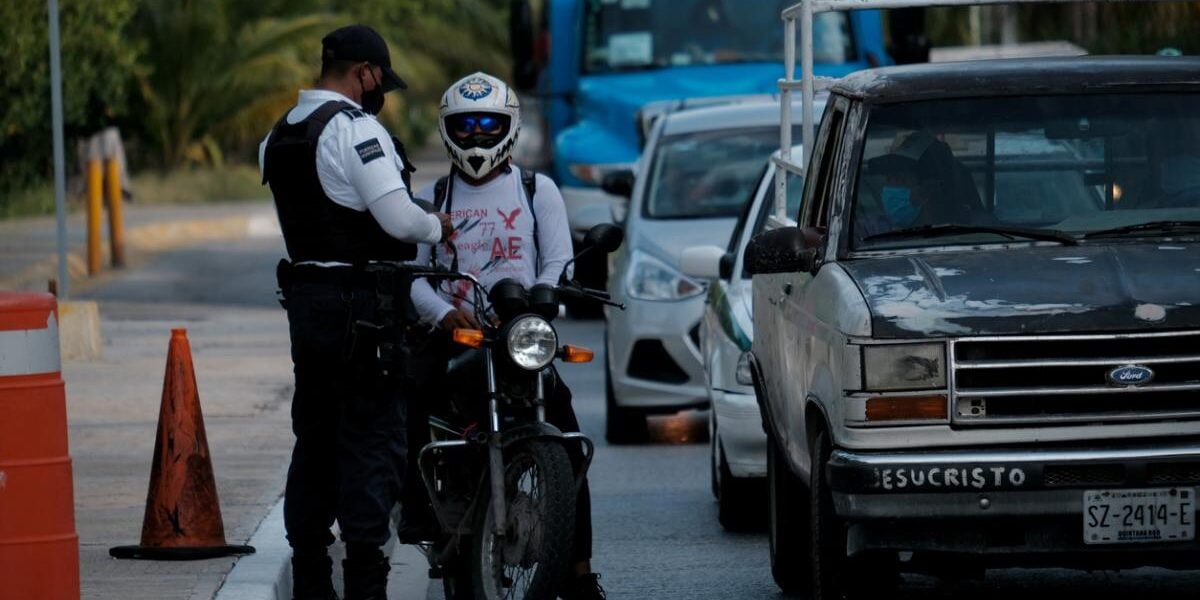
Rental cars parked in unsecured areas can also be vulnerable to theft of valuable parts, like mechanized mirrors, stripped from them while they’re parked.
To avoid these difficulties, drive only during the day, on major roads and highways, and always park securely. If your trip focuses on cities like Mexico City or the southern regions, or if you can rely on planes or trains, consider skipping the rental car altogether.
9. Be Responsible With Alcohol and Drugs
Mexico is a popular destination for those wanting to party, but it’s important to drink responsibly. Staying sober reduces the chances of falling victim to scams, consuming unsafe food, or getting into risky situations. There have been reports of drink spiking affecting tourists in Mexico, so always keep an eye on your drinks.
Mexican pharmacies often sell medications without a prescription, but some could be counterfeit or unsafe. Avoid buying medication for recreational purposes, especially when combined with alcohol, as it can impair your judgment and safety.
While small amounts of recreational drugs are legal in Mexico, it's best to avoid them altogether. This helps you steer clear of legal issues and the risk of getting involved in drug-related violence. Also, remember that insurance won't cover injuries or accidents that occur while under the influence of alcohol or drugs.
10. Download Your Travel Essentials
Mexico has excellent internet coverage in its cities and towns, but coverage can be spotty when traveling between cities. To ensure you have access to maps and other essential information, download Google Maps before you leave.
Keep your travel documents handy, especially when crossing borders or dealing with police encounters. Whether it's lodging reservations, prescriptions, or trip-related correspondence, it’s a good idea to have these downloaded and ready for quick access.
Print out key documents to ensure you can share them securely, and avoid handing your passport or phone to others unless absolutely necessary.
Ready for the Adventure of a Lifetime?
Whether you're searching for adventure, relaxation, or cultural discovery, Mexico offers something special for every traveler.
From women and people of color to LGBTQ+ travelers, resort lovers, and adventure seekers, people from all walks of life are sharing their stories and inspiring others to experience the magic of Mexico.
But no matter what kind of traveler you are, one thing is clear – investing in coverage is essential. With the right plan, you can explore the country with confidence, knowing you're protected, whatever comes your way. With this peace of mind, you can focus fully on the adventure at hand.

Find the Best International Travel Insurance
- Get multiple quotes and coverage options
- Travel Medical, Trip Cancellation & more options available
- Find the best plan for your needs and budget
So, are you ready to embark on your worry-free journey? Get a free quote now and find the best coverage for your Mexican adventure!
Read More
Author: Emily Cotlier is a senior editor at International Citizens Insurance. She has made the move from the U.S.A. to New Zealand. For International Insurance, she clarifies international visa and immigration requirements, shares travel resources, and advises on relocation challenges. She’s traveled through five continents and Oceania, and she still loves to travel both in Aotearoa New Zealand and around the world.

